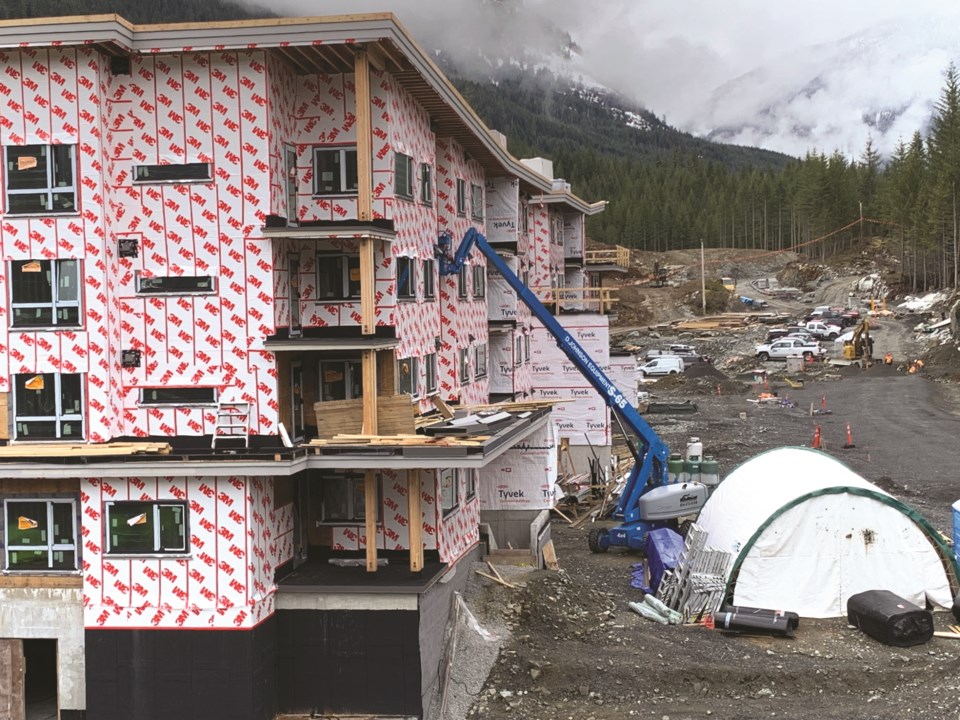Builders in the Resort Municipality of Whistler (RMOW) can look forward to more certainty, transparency and faster permitting times thanks to changes in the municipal permitting process—but they might end up paying more for it than they’re used to.
On Dec. 6, Whistler’s mayor and council voted to amend the RMOW’s Land Use and Procedures Bylaw to revise permitting fees and improve processes for development variance (DVP) and development permits (DP).
The hope is that the changes will speed up permitting and improve cost recovery at municipal hall.
According to manager of development planning Melissa Laidlaw, the goal of the updated fee structure is to implement better cost recovery, create a transparent fee structure, give more certainty to applicants, and streamline permitting.
“The existing fee structure does not adequately recover the cost of all staff resources associated with application processing. We’ve only been tracking the planning department staff time in that cost recovery,” said Laidlaw.
“It doesn’t provide transparency to an applicant on the total cost upfront of what their application will cost them for processing. It’s inefficient to administer, and the majority of the fees have remained static since 2013, and as we know, staff wages and other expenses have gone up.”
The amendment changes the fee system from an estimating model to a streamlined, all-inclusive system. The changes take into account staff time in other departments, which was not previously accounted for, and simplify processes.
The new structure replaces a complicated system that requires applicants to pay upfront application fees and additional fees for third-party consulting, statutory notifications and permit-filing fees.
The result is permitting fees that are, at least on the face of it, much higher and could prove a financial barrier for event producers.
For example, Temporary Use Permit applications, typically needed for significant events in Whistler, now come with a $3,000 flat fee if delegated and $4,700 if they require council permission to proceed. That’s up from a baseline fee of $240 (plus staff time, legal services, advertising, etc.) for delegated TUP applications and $2,400-plus for non-delegated.
Amendments to zoning bylaws or land use contracts, meanwhile, will go from a base fee of $1,500-plus to one of two massive base fees: $15,000 for applications related to density changes below 465 square metres, and $30,000 for density changes above that threshold.
If a public hearing is required, tack on an extra $3,500; an extra $1,500 on top of that if it goes to Advisory Design Panel.
The bylaw also introduces some new fees, for site inspections ($375) and property zoning inquiries ($250 per property request), while also increasing fees for title searches (from $21 to $35) and outdoor patio licences (from a base of $240-plus to $1,200).
In addition to the fee structure changes, the RMOW is also redesigning rezoning application notification signs. The new signs will include a map of the site with all the roads adjoining the development site labelled and a rendering of the proposed development for more complex projects.
The changes to the Land Use and Procedures Bylaw, which governs how permits are processed, come on the heels of amendments made earlier this year that removed some of the red tape on permit applications to improve permitting efficiency.
When that bylaw moved through its first three readings, council requested staff do a comprehensive review of all fees for planning applications and development-related services. The new bylaw update is a result of that request.
According to Laidlaw, in many cases, the invoices associated with a project alone can take weeks to go through, resulting in slower building permit issuances—and contributing to the ongoing permitting backlog plaguing municipal hall.
The amendment received first readings at the Dec. 6 council meeting and will come back for adoption at a future meeting.






